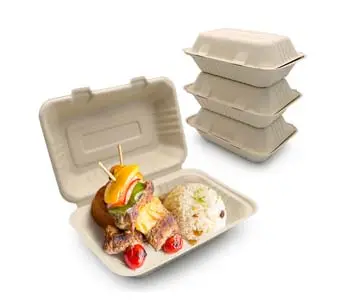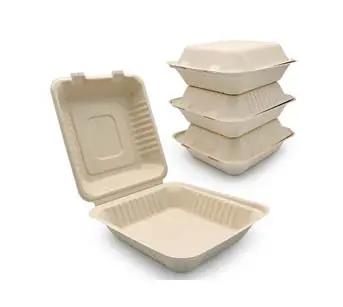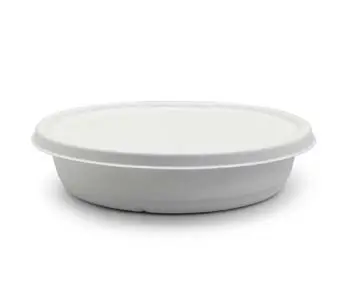Embracing Sustainability in the Food Industry: The Rise of Biodegradable Takeout Containers
The food industry plays a significant role in our daily lives, satisfying our cravings and nourishing our bodies. However, the alarming environmental impact caused by its excessive use of single-use plastic packaging has become an undeniable concern. In response to this pressing issue, biodegradable takeout containers have emerged as a game-changing solution.
These innovative containers are designed to naturally break down over time, reducing waste and minimizing harm to the planet. This article explores the definition and importance of biodegradable takeout containers while providing an insightful overview of the thriving wholesale market for these sustainable packaging options.
Definition of Biodegradable Takeout Containers
Biodegradable takeout containers refer to environmentally-friendly alternatives to traditional plastic packaging that are specifically designed for food delivery and takeaway purposes. Unlike conventional plastics, which can persist in the environment for hundreds of years without decomposing, biodegradable containers are made from organic materials that can naturally break down through biological processes into non-toxic components. These materials often include plant-based plastics, bagasse (a byproduct of sugarcane processing), or even paper-based products sourced sustainably from responsibly managed forests.
The Importance of Using Biodegradable Materials in the Food Industry
Recognizing the importance of embracing sustainability practices within the food industry is crucial for both environmental preservation and long-term business viability. With millions of tons of plastic waste generated annually from food packaging alone, transitioning towards biodegradability is not just an ethical choice but also a necessity.
Understanding the significance of incorporating biodegradable tableware materials is essential in preserving the environment and ensuring the long-term success of businesses in the food industry. As millions of tons of plastic waste are generated each year from food packaging, adopting sustainable practices and investing in biodegradable takeout containers on a wholesale level becomes imperative for a sustainable future.
Biodegradable takeout containers offer a sustainable alternative that reduces plastic pollution levels substantially. By utilizing packaging materials that can naturally degrade over time without leaving behind harmful residues or microplastics, businesses demonstrate their commitment to environmental stewardship and contribute to a healthier planet for future generations.
Overview of the Wholesale Market for Biodegradable Takeout Containers
As awareness of environmental issues grows and consumer demand for sustainable food packaging rises, the wholesale market for biodegradable takeout containers has witnessed a remarkable surge in recent years. A wide array of manufacturers, suppliers, and distributors have emerged to cater to this growing need. These wholesale channels provide businesses with convenient access to a broad range of biodegradable container options at competitive prices.
From plant-based plastics such as polylactic acid (PLA) containers, to bagasse-based alternatives and paper-based options, the market offers diverse solutions that align with different food packaging requirements. This thriving sector ensures that businesses can easily adopt sustainable practices while meeting their operational needs efficiently.
Understanding Biodegradability
What Makes a Material Biodegradable?
When we refer to a material as biodegradable, we are essentially highlighting its ability to decompose naturally over time, thanks to the presence of microorganisms. These microorganisms break down the complex molecular structure of the material into simpler compounds, such as water, carbon dioxide, and biomass.
The use of biodegradable tableware materials is crucial in reducing the environmental impact of food packaging. By harnessing the power of microorganisms to break down these materials into harmless compounds, we can minimize waste accumulation and contribute to a more sustainable and eco-friendly approach in the food industry.
In order for a material to be considered truly biodegradable, this process must occur within a reasonable timeframe and without leaving behind any harmful residue. The key factor here is that biodegradation occurs through natural biological processes rather than relying on industrial treatments or extreme environmental conditions.
Different Types of Biodegradable Materials Used in Takeout Containers
The food industry has witnessed an impressive array of materials introduced as alternatives to traditional plastic takeout containers. Among these options are plant-based plastics derived from renewable resources like cornstarch or sugarcane.
These plant-based plastics, such as polylactic acid (PLA), offer comparable functionality and durability while being compostable under specific conditions. Another popular choice is bagasse, which is a fibrous byproduct obtained from sugarcane processing.
Bagasse-based containers are not only biodegradable but also microwave-safe and resistant to grease and moisture. Additionally, paper-based materials have also gained traction due to their recyclability and compostability.
Comparison between Biodegradable and Compostable Materials
Although often used interchangeably, it's important to distinguish between biodegradability and compostability when discussing eco-friendly materials for takeout containers. While both terms indicate environmentally friendly characteristics, compostable materials go a step further by meeting specific standards for breaking down into nutrient-rich compost within industrial composting facilities.
This process typically requires controlled temperature and humidity levels that may not be naturally achievable in home or backyard composting systems. Therefore, compostable materials, such as certified compostable plastics or certain biodegradable papers, should be sent to specialized facilities for proper decomposition.
On the other hand, biodegradable materials can break down naturally through microbial activity anywhere in the environment without requiring specific composting conditions. By understanding what makes a material biodegradable and exploring the different types used in takeout containers, we can make informed decisions about sustainable packaging choices.
Additionally, distinguishing between biodegradability and compostability helps us assess the appropriate disposal methods for these alternative materials. As we move towards a greener future, it is crucial to embrace these advancements in our food industry practices and contribute to reducing waste and environmental impact.
Benefits of Biodegradable Takeout Containers Wholesale
Preserving the Planet: Reducing Waste and Lowering Carbon Footprint
Biodegradable takeout containers offer significant environmental advantages when compared to their traditional counterparts. By opting for biodegradable materials, food establishments contribute to the reduction of waste in landfills, as these containers break down naturally over time. Unlike conventional plastics that may linger for centuries, biodegradable materials can degrade within months or years, minimizing their impact on the planet.
The use of biodegradable boxes for food offers significant environmental advantages, as they contribute to waste reduction in landfills due to their natural decomposition process. Unlike traditional plastics that persist for long periods, biodegradable materials break down within a shorter timeframe, making them a sustainable choice that minimizes their overall impact on the environment.
Furthermore, biodegradable takeout containers have a lower carbon footprint due to their production process involving renewable resources and fewer fossil fuels. This helps mitigate climate change and supports sustainable practices.
Protecting Public Health: Avoiding Exposure to Harmful Chemicals
Another compelling reason to embrace biodegradable takeout containers is the health benefits they offer. Traditional plastic containers often contain harmful chemicals such as phthalates and bisphenols that can leach into food when exposed to heat or acidic substances.
These chemicals have been linked to various health issues like hormonal imbalances and developmental disorders. In contrast, biodegradable alternatives are typically made from natural or plant-based materials without the use of toxic additives, ensuring that food remains uncontaminated during transportation and consumption.
Elevating Brand Reputation: Meeting Consumer Expectations
In today's socially conscious world, consumers increasingly prioritize sustainability in their purchasing decisions. Embracing biodegradable takeout containers wholesale sends a clear message that a brand values environmental responsibility.
This fosters positive customer perception by showcasing a commitment to reducing ecological harm. By aligning with consumer values, businesses can attract an environmentally conscious clientele who will appreciate their efforts towards sustainability.
Moreover, incorporating biodegradable packaging into a brand's identity allows it to differentiate itself from competitors who have not yet embraced eco-friendly practices—ultimately leading to a competitive edge in the market. Opting for biodegradable takeout containers wholesale brings numerous benefits.
It contributes to the preservation of the environment by reducing waste and lowering carbon footprint. Moreover, it safeguards public health by eliminating exposure to harmful chemicals commonly found in traditional plastic containers.
Embracing biodegradable materials enhances brand reputation and customer perception by meeting consumer expectations for sustainability. By considering these advantages, businesses can make an informed decision when choosing packaging solutions that align with their values and objectives.
Types and Varieties of Biodegradable Takeout Containers Wholesale
Plant-based plastics: A Sustainable Solution with Promising Properties
When it comes to biodegradable takeout containers, one notable option is PLA, or polylactic acid. Derived from renewable resources such as corn or sugarcane, PLA containers offer a viable alternative to traditional plastic.
These containers possess excellent clarity, making them visually appealing for food presentation. Moreover, PLA containers are heat-resistant, ensuring they withstand various temperatures without compromising their structural integrity.
They also have a smooth texture and can be easily molded into diverse shapes and sizes to accommodate different food items. Although PLA containers may have slightly higher production costs compared to conventional plastics, their minimal environmental impact and biodegradability make them an attractive choice for eco-conscious consumers.
Bagasse Containers: Harnessing the Power of Sugarcane Byproduct
Bagasse takeout containers are crafted from a byproduct of the sugarcane industry—fibrous residue left after extracting juice from sugarcane stalks. This makes bagasse containers an innovative way to repurpose what would otherwise become waste material. Bagasse boasts notable features that contribute to its popularity in the realm of takeout packaging: it is microwave-safe, oil-resistant, and can withstand both hot and cold food items without losing its shape or integrity.
Furthermore, bagasse is an excellent insulator that helps maintain the desired temperature of the food inside the container while keeping hands cool on the outside. As a renewable resource with low environmental impact and impressive functionality, bagasse takeout containers offer an eco-friendly solution for businesses seeking sustainable packaging alternatives.
Paper-based Containers: Eco-Friendly Versatility in Design
Paperboard has long been recognized as a sustainable packaging material due to its recyclability and biodegradability. Paper-based takeout containers are ideal for those seeking a more natural aesthetic and texture.
With its lightweight yet sturdy composition, paperboard containers provide adequate protection for food items while allowing for easy handling. These containers often feature grease-resistant coatings or laminations to prevent leakage, ensuring that even saucy dishes can be transported without worry.
In addition to traditional clamshell-style designs, there is a wide variety of innovative paper-based container options available, including foldable boxes with interlocking tabs and compartmentalized trays. Such versatility in design allows businesses to cater to different types of cuisine and enhance the overall dining experience for customers.
By exploring the unique properties and benefits of plant-based plastics like PLA, bagasse containers derived from sugarcane byproduct, and the diverse range of paper-based options such as foldable boxes and compartmentalized trays, businesses can make informed decisions when it comes to selecting the most suitable biodegradable takeout containers wholesale. Each option offers its own set of advantages while contributing significantly to reducing environmental impact in the food industry.
Factors to Consider When Choosing Biodegradable Takeout Containers Wholesale
Durability and Leak Resistance
One of the crucial factors to consider when selecting biodegradable takeout containers wholesale is their durability and leak resistance. These containers should be able to withstand the rigors of transportation, stacking, and handling without compromising their integrity.
Look for containers that are made from sturdy materials such as plant-based plastics or bagasse, as they offer excellent durability. Additionally, ensure that the containers have proper sealing mechanisms to prevent any leaks or spills during transportation and food delivery.
Heat Resistance for Various Types of Food Items
When choosing biodegradable takeout containers wholesale, it is essential to consider their heat resistance capabilities. Different types of food items require specific temperature conditions to stay fresh and safe for consumption.
Ensure that the chosen containers can withstand high temperatures without deforming or releasing harmful substances into the food. Look for heat-resistant materials like PLA (polylactic acid) or bagasse-based containers that can handle hot foods while maintaining their structural integrity.
Compatibility with Different Packaging Needs (e.g., Lids, Dividers)
Another crucial factor is the compatibility of biodegradable takeout containers with diverse packaging needs such as lids and dividers. Depending on your specific requirements, you may need containers that can securely accommodate various accessories like condiment cups, sauce compartments, or dividers to separate different food items within a single container. Ensure that the chosen wholesale supplier offers a wide range of container options with compatible accessories to meet your packaging needs effectively.
Finding Reliable Wholesale Suppliers
A: Researching
To find reliable wholesale suppliers for biodegradable takeout containers, thorough research is essential. Start by exploring reputable online directories specifically dedicated to sustainable packaging suppliers.
Look for suppliers with a strong track record in providing high-quality biodegradable containers and excellent customer service. Check for certifications like BPI (Biodegradable Products Institute) or compostability certifications to ensure compliance with industry standards.
Engage in conversations with potential suppliers, asking about their manufacturing processes, materials sourcing, and any eco-friendly initiatives they undertake. Seeking recommendations from other businesses or industry professionals can also lead to discovering trustworthy wholesale suppliers.
Conclusion
In this era where environmental consciousness is on the rise, opting for biodegradable takeout containers wholesale offers numerous benefits for both businesses and the planet. By considering factors such as durability, leak resistance, heat resistance, and compatibility with packaging needs, businesses can ensure the selection of containers that meet their specific requirements.
Additionally, researching reliable wholesale suppliers who prioritize sustainability will guarantee access to high-quality products that align with eco-friendly values. By embracing biodegradable takeout containers wholesale and making sustainable choices in our everyday operations, we contribute towards building a greener future while maintaining the integrity of our foodservice industry.




